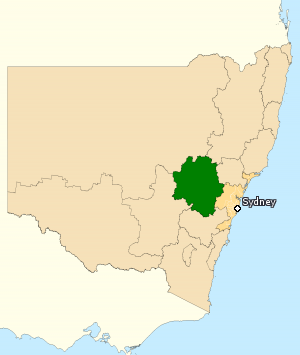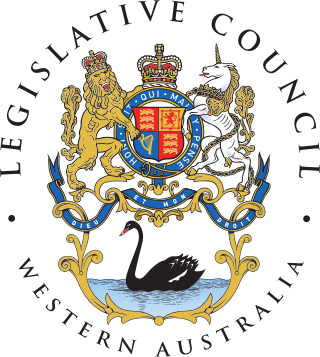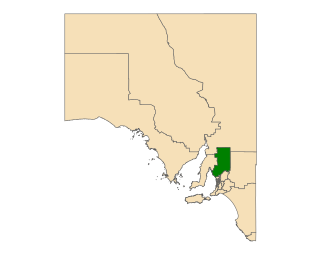Related Research Articles

The House of Assembly, or lower house; Is one of the two chambers of the Parliament of South Australia. The other is the Legislative Council. It sits in Parliament House in the state capital, Adelaide.

The Australian Electoral Commission (AEC) is the independent statutory authority and agency of the Australian Government responsible for the management of federal Australian elections, by-elections and referendums.
Elections in Australia take place periodically to elect the legislature of the Commonwealth of Australia, as well as for each Australian state and territory and for local government councils. Elections in all jurisdictions follow similar principles, although there are minor variations between them. The elections for the Australian Parliament are held under the federal electoral system, which is uniform throughout the country, and the elections for state and territory Parliaments are held under the electoral system of each state and territory.

Electorates of the Australian House of Representatives are single member electoral districts for the lower house of the Parliament of the Commonwealth. There are currently 151 electorates.

The Division of Calare is an Australian electoral division in the state of New South Wales.

The Parliament of South Australia is the bicameral legislature of the Australian state of South Australia. It consists of the 47-seat House of Assembly and the 22-seat Legislative Council. General elections are held every 4 years, with all of the lower house and half of the upper house filled at each election. It follows a Westminster system of parliamentary government with the executive branch required to both sit in parliament and hold the confidence of the House of Assembly. The parliament is based at Parliament House on North Terrace in the state capital of Adelaide.

The Western Australian Legislative Council is the upper house of the Parliament of Western Australia, a state of Australia. It is regarded as a house of review for legislation passed by the Legislative Assembly, the lower house. The two Houses of Parliament sit in Parliament House in the state capital, Perth.
Since 1970, the South Australian House of Assembly — the lower house of the Parliament of South Australia — has consisted of 47 single-member electoral districts consisting of approximately the same number of enrolled voters. The district boundaries are regulated by the State Electoral Office, according to the requirements of the South Australian Constitution and are subject to mandatory redistributions by the South Australian Electoral Districts Boundaries Commission in order to respond to changing demographics.

The Division of New England is an Australian electoral division in the state of New South Wales.
Legalise Cannabis Australia (LCA), also known as the Legalise Cannabis Party (LCP) and formerly the Help End Marijuana Prohibition (HEMP) Party, is a single-issue Australian political party. It has a number of policies that centre around the re-legalisation and regulation of cannabis for personal, medicinal and industrial uses in Australia.

Frome is a single-member electoral district for the South Australian House of Assembly. It is named after Edward Charles Frome, the third surveyor-general of South Australia. The electorate stretches north-eastwards from the Gawler River and Gulf St Vincent in the south, and includes many of the agricultural areas of the Clare and Gilbert Valleys. It covers a total of 12,921 km2 (4,989 sq mi) and takes in the towns of Auburn, Clare, Mintaro, Port Broughton, Saddleworth, Snowtown and Riverton. Prior to the 2020 redistribution, its main population centre was Port Pirie, since transferred to Stuart.
An election commission is a body charged with overseeing the implementation of electioneering process of any country. The formal names of election commissions vary from jurisdiction to jurisdiction, and may be styled an electoral commission, a central or state election commission, or an election board, an electoral council or an electoral court. Election commissions can be independent, mixed, judicial or executive. They may also be responsible for electoral boundary delimitation. In federations there may be a separate body for each subnational government. An election commission has a duty to ensure elections are conducted in an orderly manner.
The lower houses of the parliaments of the states and territories of Australia are divided into electoral districts. Most electoral districts send a single member to a state or territory's parliament using the preferential method of voting. The area of a state electoral district is dependent upon the Electoral Acts in the various states and vary in area between them. At present, there are 409 state electoral districts in Australia.

The New South Wales Electoral Commission (NSWEC) is a statutory integrity agency with responsibility for the administration, organisation, and supervision of elections in New South Wales. It reports to the NSW Department of Premier and Cabinet.
The Electoral Commission SA is an independent office which forms part of the Government of South Australia, and which conducts parliamentary state elections every four years.
The voting rights of Indigenous Australians became an issue from the mid-19th century, when responsible government was being granted to Britain's Australian colonies, and suffrage qualifications were being debated. The resolution of universal rights progressed into the mid-20th century.

The Arts Party is an Australian political party inspired by the importance of the arts and creative action. The party was voluntarily deregistered with the Australian Electoral Commission on 25 June 2019, but remains registered for local elections with the New South Wales Electoral Commission.
Centre Alliance (CA), formerly known as the Nick Xenophon Team (NXT), is a centrist Australian political party based in the state of South Australia. It currently has one elected representative, Rebekha Sharkie in the House of Representatives.

The 2022 South Australian state election was held on 19 March 2022 to elect members to the 55th Parliament of South Australia. All 47 seats in the House of Assembly, and half the seats in the Legislative Council were up for re-election.
References
- ↑ History of South Australian elections, 1857-2006 - by Dean Jaensch - ISBN 978-0-9750486-3-4